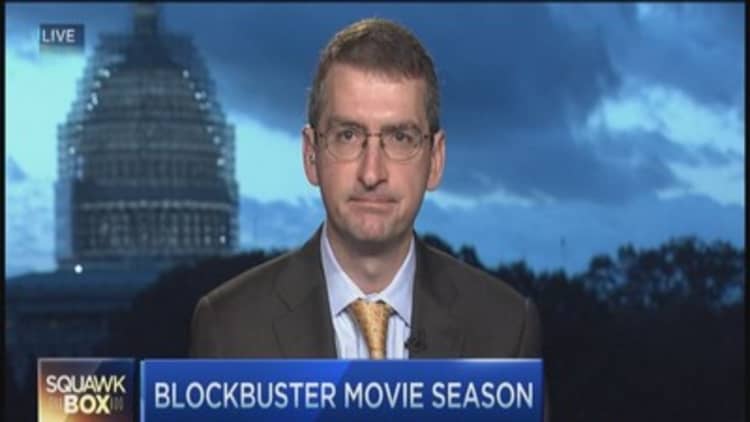
The biggest 2014 opening weekend at the box office should be great news for the studio behind the movie, right?
Not for Lionsgate, which is experiencing the fickle game of expectations on Wall Street after the latest installment of its "Hunger Games" series fell short. But Barton Crockett, media analyst at FBR Capital Markets, told CNBC Monday that he does not see a big problem.
"The Hunger Games: Mockingjay — Part 1" did top the weekend box office with North American ticket sales of $123 million. But that was 22 percent lower than sales for the prior "Hunger Games" movie and below projections of as much as $150 million domestically.
Industry watchers blamed a number factors, including the fact that "Mockingjay" was not playing in premium IMAX venues because the theater chain was still showing "Interstellar." The first "Hunger Games" movie made more than $10 million in IMAX, before the second one, "Catching Fire," pulled in about $12 million on IMAX screens.
"We are trimming [Lionsgate] estimates a little bit, by 1 percent or so, this morning," Crockett said in a "Squawk Box" interview. "It's helpful that Lionsgate is running so lean." The studio is said to have spent about $50 million to market the film domestically, which the FBR analyst said is a lot less than he was anticipating and "a lot less than you see for any movie like this."
"One of the offsets is that the movie internationally is performing better than we anticipated," Crockett added. Outside the U.S. and Canada, foreign sales on the weekend were $152 million.
He has a price target of $40 a share on Lionsgate stock, which was under pressure Monday morning. It closed at $33.25 on Friday. "It's a good holding. It's a studio stock. It's volatile."
Crockett said Lionsgate is not only a movie play, with successes on the small screen such as "Orange Is the New Black" on Netflix and "Anger Management" on FX.
Read MoreWhat will Nielsen's streaming measurement reveal?
For investors looking for another studio play, he recommended Disney, with a price target of $105 a share. The stock closed Friday at nearly $89.
"Disney is a company that is rebooting "Star Wars" next year. And they've got sequels to the Marvel movies stretching out as long as the eye can see [and] great animation sequels coming up in Pixar," he argued. "Their studio segment, I think, is going to increase profits $1 billion annualized-plus over the next several years, which is going to be helpful to Disney stock."
Crockett said he also likes the movie theater stocks, such as AMC Entertainment, which is "reformatting for luxury seating, getting premium pricing out of that. He thinks AMC will benefit from a "great slate" of movies next year.
He has a $29-a-share price target on AMC, which closed Friday at $25. (Disclosure: FBR said it acts as a market maker or liquidity provider for Disney, Lions Gate Entertainment. FBR said it has received compensation for investment banking services from AMC. For other FBR disclosures, here's a link.)
In the two weeks following "The Hunger Games" movie releases or related news announcements, Lionsgate shares lost an average of 4.71 percent and traded positively only a quarter of the time, according to historical data from Kensho, a quantitative analytics tool used by hedge funds. Disney and Fox gained an average of 0.96 percent and 1.03 percent, respectively, in the same time period.
Disclosure: CNBC's parent, NBCUniversal, is a minority investor in Kensho.


